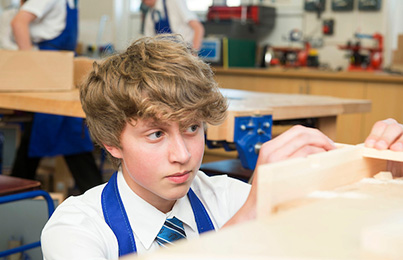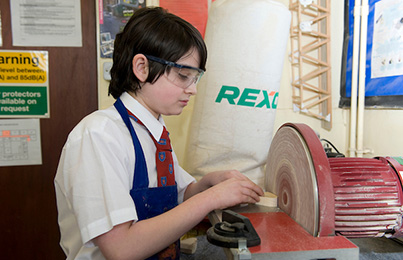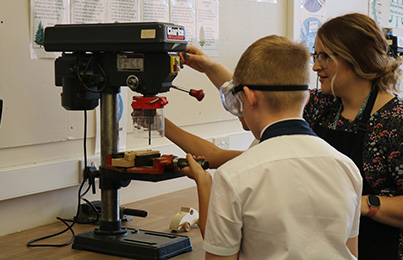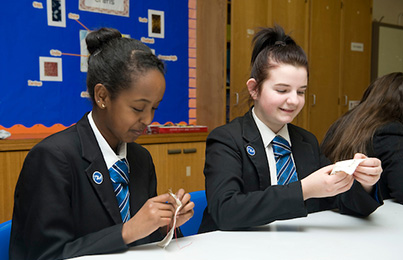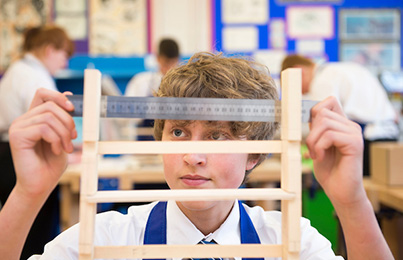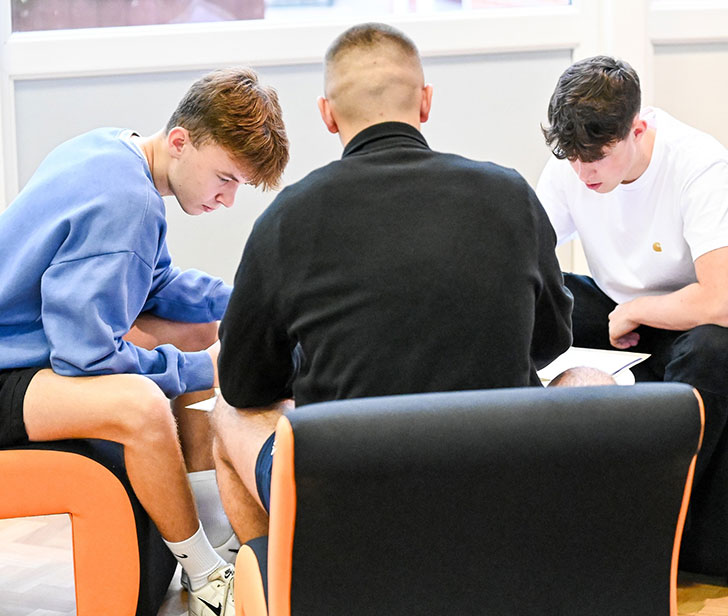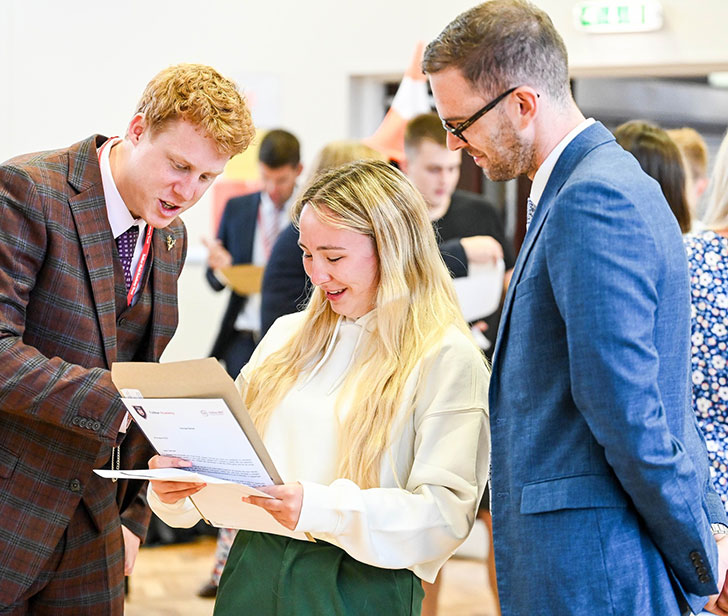Technology
Curriculum Intent, Implementation & Impact
- Technology
- Ethos & Values
- Knowledge & Skills
- Resources & Facilities
- Courses & Qualifications
- Learning Outside The Classroom
- Where Does This Take Me In The Future?
Technology
WELCOME!
The Design and Technology Curriculum Area is well organised, forward-thinking and practically based.
Students are able to develop further their understanding of the design industry from hands-on interaction with modern processes (i.e. 3D printing, laser cutting, thermo printing and computer aided embroidery) and materials (i.e. neoprene, polymorph).
We also have a brand-new Food Technology room, offering pupils an opportunity to develop their practical cookery skills and techniques as they explore the underlying principles of food science, nutrition, food traditions and food safety.
We aim to inspire students to be inquisitive, creative and innovative. We are firmly committed to improving all that we do and invite you to take a further look at what we have to offer.
Ethos & Values
- To raise attainment by improving confidence, self-belief and encouraging pride in students' own work;
- To consistently set high standards of expectations and match these with high quality teaching, resources and learning experiences;
- To provide a range of educational experiences appropriate to the age, ability and needs of our students relating to industrial processes and practices;
- To manage resources and monitor the development of new trends to ensure maximum benefit to our learners and learning environment;
- To adopt a philosophy of continuous improvement in all aspects of the delivery of all subjects within the Curriculum Area;
- To enhance students' quality of learning through effective delivery of the Resistant Materials and Textiles technologies.
Food Technology
- Food technology aims to equip learners with the knowledge, understanding and skills required to cook and apply the principles of food science, nutrition and healthy eating. We will encourage learners to cook and make informed decisions about a wide range of further learning, opportunities and career pathways as well as develop life skills that enable learners to feed themselves and others affordably, now and in later life.
- We see our curriculum as another step towards creating a healthier society and improving the nation's cooking skills as well as setting some students on the path to careers in the food and hospitality industries.
Knowledge & Skills
- Design and Technology prepares students for participation in tomorrow's rapidly developing world of technologies;
- Students are provided with the necessary individual and team skills to gain confidence in their own abilities and become creative problem solvers;
- Sudents will recognise needs, wants and opportunities and respond to them by developing a range of ideas and making products and systems that successfully meet these demands;
- Students will practise skills in research, communication and management in design and production;
- Students will improve all areas of practical, spoken, and written communication skills through experiencing a wide range of learning styles from specialist teachers;
- Students will develop an understanding of aesthetics, social, moral and environmental issues;
- Students will experience working with CAD/CAM and other industrial based processes;
- All students are encouraged to express personal and informed opinions through design, research, analysis and evaluation tasks. The main focus is upon the improvement of practical problem-solving skills for a variety of purposes and consumer groups. Creativity is actively encouraged, as is the importance of accuracy and presentation within all forms of work. All Key Stage 3 and 4 students have access to the ICT suite using programs such as SolidWorks, Corel Draw and Sketch Up and to the CAD/CAM centre.
Food Technology
- Demonstrate effective and safe cooking skills by planning, preparing and cooking using a variety of food commodities, cooking techniques and equipment;
- Develop knowledge and understanding of the functional properties and chemical processes as well as the nutritional content of food and drinks.
- Understand the relationship between diet, nutrition and health, including the physiological and psychological effects of poor diet and health;
- Understand the economic, environmental, ethical and socio-cultural influences on food availability, production processes and diet and health choices;
- Our students will discover the essentials of food science, nutrition and how to cook. In addition to this, students will understand the huge challenges that we face globally to supply the world with nutritious and safe food.
Through design and technology, all students can become discriminating and informed users of products, and become innovators.
Resources & Facilities
There are currently four workshops equipped for multi-media design and/or construction work with resistant materials. One of the workshops has been equipped with resources to support Engineering activities; another has an annexe that holds specialist metal working equipment. All workshops have either an interactive whiteboard and associated ICT facilities or state of the art projectors.
Across the workshops there is the capability to apply all traditional, and many of the modern, processes. Resources are always being reviewed and updated - with purchases such as 3D printers, heat press and sublimation printing being added more recently to the facilities.
We have a dedicated CAD/CAM centre, which gives access to Laser cutting and specialist CNC (Computer Numerical Control) machines used for processes as turning, milling and routing. Further to this, within the Curriculum Area we have a dedicated computer suite which houses a total of 25 multi-media PCs and other audio-visual equipment including a number of 3D printers.
Our three Textiles rooms each contain a full suite of sewing machines, computer controlled sewing machines and other supporting resources. All of the Textiles rooms have interactive whiteboards or projection facilities and computer access to support creativity and research. Again, equipment is kept up to date providing pupils with access to modern manufacturing processes such as dye sublimation and heat pressing.
To support students' learning and engagement in the theoretical side of the curriculum, we have a dedicated theory classroom which provides a comfortable and focused learning environment. This room also plays host to a second laser cutter and a bank of computers.
Our food room is a fully operational working kitchen. Students have spaces to prep food with ovens and sinks, etc. There is space for them to leave their ingredients. There are fully functioning demonstration areas so ALL students can see first-hand the dishes that they will need to be preparing.
Courses & Qualifications
In Key Stage 3 you will be timetabled for Technology, Textiles and Food Technology throughout the year.
We aim to teach Design and Technology through a range of activities such as:
- Product Analysis - where students examine the designing and making of other designers - both historical and contemporary;
- Focused Practical Tasks (FPTs) - short tasks with a specific teaching point, for example, to develop a technique, a skill and understanding of a process or knowledge;
- Design and Make Assignments (DMAs) - longer tasks where students demonstrate their capability to design and make in the specialist area.
Our Food technology provides opportunities for students to:
- Have hands-on experiences with food.
- Learn about and gain confidence in basic food hygiene and preparation skills.
- Learn about healthier eating through practical food work.
- Apply simple budgeting skills to food choices they make.
Key Stage 4: Students can select the following course for further study in Years 10 and 11.
GCSE Design & Technology - This course enables students to develop an awareness of the nature and significant importance of Design & Technology in a rapidly changing society. Candidates will develop their knowledge, skills and understanding of materials, processes and construction techniques of textiles and resistant materials within an overall 'design and make' approach. The content of the specification aims to provide a coherent, satisfying and challenging course of study for candidates, where they can expect to experience the latest CAD/CAM facilities along with other modern manufacturing techniques.
Learning Outside The Classroom
Clubs & Activities: Teachers offer their skills and supervision either during the lunch break or after school allowing students to further their skills with a range of fun activities from 3D printing and metal turning to textiles and design clubs.
Additional Support: All Year 11 students have access to coursework support clinics and additional examination revision throughout the academic year and frequently during half-term holiday periods.
How can parents/carers help and what can be done at home?
- Discuss their choice of recipe and encourage them to weigh out ingredients independently.
- Encourage your son or daughter to get involved in the family meal planning, preparation and cooking as much as possible.
- Get them involved in the shopping. Talk to them about food choice, budgeting, diet and nutrition, labelling and packaging to expand their knowledge in a family context.
- Take them to events such as the Lincolnshire Food and Drink Festival www.humberandlincolnshireevents.co.uk.
- Sign up to events such as the 'BNF news' to get updates on food events and information www.nutrition.org.ukor @BNF events.
- Take an active interest in your son's or daughter's project work.
- Allow them to practise their skills if you have access to a workshop environment at home or with extended family.
- Provide opportunities to visit a wide range of museums, art galleries, exhibitions, etc.
- Including them in everyday shopping activities – clothes shopping (looking at fibre content); conscientious shopping – asking questions 'Why is that so inexpensive?' Check labels for countries of manufacture - 'Do you think their workers get paid much?' Looking at product packaging in the supermarket questioning 'Is it necessary?' 'How could you improve that?'
- Investigate exhibitions such as the Great British Sewing Bee Live: www.thegreatbritishsewingbeelive.com
- Investigate The British Style Collective (the old clothes show live): www.britishstylecollective.com
Where Does This Take Me In The Future?
Design and Technology:
- Provides technical and employability skills, knowledge and understanding which are transferable and will enable individuals to meet changing circumstances, whether these arise from a shift in their own status or in employment;
- Provides a good progression route to more advanced qualifications in Further Education and Higher Education;
- Provides opportunities for students who may wish to be employed in apprenticeships or work-based learning environments;
- Helps students to think and function independently and to become financially capable;
- Provides a solid foundation of design appreciation which can be developed into industrial, fashion, interior and product design or any of the engineering fields.
Food Technology
- Provides technical knowledge and skills to enable individuals to make informed decisions in relation to nutrition to help them plan, prepare & cook a variety of dishes through the application of different techniques & processes.
- Provides an understanding of the relationship between diet, nutrition and health which are key employability skills that are transferrable within a range of career paths in Hospitality, Catering & Healthcare professions.
- Helps students to apply their knowledge of nutrition to facilitate the ability to feed themselves and others affordably using valuable life skills.
- Provides a plethora of opportunities for students who may wish to follow a work-based learning environment, or the apprenticeships route.
- Provides a suitable foundation to enter into further qualifications or career paths such as hospitality, catering, nutritionists, healthcare, fitness industry and food scientists.



